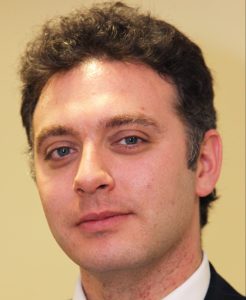
‘Missing-ness’ is the theme for the October 2023 issue of the BJGP. In our process-driven, target-focussed times there is much to miss.
Consider, if you will, a scenario involving medical students in a simulated GP consultation. The initial task is to conduct a review of asthma medication with a young woman in her late teens and to respond to patient needs as they arise. The patient answers questions about her asthma minimally but adequately. Her arms are folded. She appears tearful and rather than making eye contact with the student she stares into the corner of the room at nothing in particular. In scenarios like this in the past I have encountered students who gather the specific data about asthma and conclude the interview in under ten minutes, those who do so then feed back that there was a patient unmet need that was unexplored. Others broach the idea with the patient that something else might be troubling her and ask if it is anything they can help with.
In our process-driven, target-focussed times there is much to miss.
In The Birth of the Clinic: An Archaeology of Medical Perception, Michel Foucault developed the concept of ‘the medical gaze’, describing how doctors fit the patient’s story into a biomedical paradigm, filtering out non-biomedical material.1 A ‘gaze’ is an act of selecting what we consider to be the relevant elements of the total data stream available to our senses. In an article that packages Foucault for medical CPD, David Misselbrook observes that doctors can ‘select out the biomedical bits of the patients’ problems and ignore the rest because it suits us best that way.’2 While the clinical gaze is useful, it is also insufficient.
The Life & Times section this month highlights a variety of ways in which we as a profession and as individuals risk missing important aspects of life. More hopefully, many of the articles also suggest how we can extend and add necessary flexibility to our gaze.
Seeing the bigger picture ?
Iona Heath reminds us that planet Earth (Patient Earth), is sick and medical doctors are mainly absent. Instead of doctors being connected to the human condition, pharmaceutical industries become part of both planetary and human health — threatening overconsumption. The humanities offers hope by reconnecting us with each other as storied beings in search of meaning.3 While Iona writes that few patients can be cured by a doctor they do not like, Terry Kemple suggests that a similar principle applies to climate change, ‘Warnings must overcome our natural belief to think that we are safe, and then guide us to take actions that clash with our perceptions of safety. This is the main challenge for public warnings.’ 4
He goes on explain that unless we hear consistent warnings from multiple trusted sources, with useable guidance for action, we will continue to prioritise our immediate needs and desires over our longer-term welfare and that of our descendants. Saul Miller brings this home, showing how short-termism and expediency have resulted in a slew of recent British catastrophes.5
Seeing the coercive external influences?
Both book reviews discuss how personal and political influences impact on our patients, colleagues and compatriots that can lead to terrible harms. Jeremy Gibson reviews: In Control: Dangerous Relationships And How They End In Murder. which offers eight potentially visible stages of a coercive relationship that is heading towards murder.6
Trisha Greenhalgh reviews, We Want Them Infected: How The Failed Quest For Herd Immunity Led Doctors To Embrace The Anti-Vaccine Movement And Blinded Americans To The Threat Of COVID, and examines the dysfunctional relationships in public life that prevented an effective response to COVID-19.7
Seeing what matters to the patient (PUNS and DENS)?
Richard Armitage discusses transformative experiences and the role of the GP as medical advisor. Not only do we need to think of the person in front of us but the person that they will become.8
In a lesson for new GP-specialist trainees, Laurence Dorman shares a story handed down from his father about flexibility in the completion of medical tasks. This too is in keeping with a theme of being patient-centred in a fundamental sense, the patient dictates the timetable of care, even when the medicine apparently dictates otherwise.9
Ahmed Rashid deploys the Yonder column as (ever) as an antidote for our professional blind spots, in discussing overlooked patient unmet needs (deafness in pregnancy, the mental health of women in prison, and non- attendance at sexual health clinics) as well as doctors’ educational needs (compassion and football).10
More hopefully, many of the articles also suggest how we can extend and add necessary flexibility to our gaze.
Hana MO Elhassan reviews a dermatology website with a much-needed difference — it highlights how conditions are seen in different racial skin types.11
Nada Khan takes a deep dive into The 2023 Independent Pregnancy Loss Review, which highlights the stories of people who are ‘traumatised by their care experience and feel angry and dismayed at the total lack of compassion and support afforded to them during such a distressing time’.
Early pregnancy and pregnancy loss are both profound experiences but can also be ‘invisible’ in harmful ways.12,13
Life & Times this issue celebrates a unique selling point of both British general practice and the articles we receive, solicited and unsolicited, via our BJGP Life website. Both show us that we can see the big picture, and recognise both the sciences and humanities make invisible problems visible and pay attention to the needs of patients and populations alike.
References
- Foucault M. The Birth of the Clinic: An Archaeology of Medical Perception. London: Routledge, 1989: Ch 6. (First published as ‘Naisssance de la Clinique’. France: Presses Universitaires de France, 1963).
- Misselbrook D. Foucault. Br J Gen Pract 2013; DOI: https://doi.org/10.3399/bjgp13X668249.
- Heath I. The Patient Earth is sick, but the medical doctors are mainly absent. Br J Gen Pract 2023; DOI: https://doi.org/10.3399/bjgp23X735081.
- Kemple T. Planetary health — a warning from your future. Br J Gen Pract 2023; DOI: https://doi.org/10.3399/bjgp23X735105.
- Miller S. Expediency. Br J Gen Pract 2023; DOI: https://doi.org/10.3399/bjgp23X735189.
- Gibson J. Book review: In Control: Dangerous Relationships and How They End in Murder. Br J Gen Pract 2023; DOI: https://doi.org/10.3399/bjgp23X735165.
- Greenhalgh T. Books review: We Want Them Infected: How the failed quest for herd immunity led doctors to embrace the anti-vaccine movement and blinded Americans to the threat of COVID. Br J Gen Pract 2023; DOI: https://doi.org/10.3399/bjgp23X735153.
- Armitage R. Guiding our patients through transformative experiences. Br J Gen Pract 2023; DOI: https://doi.org/10.3399/bjgp23X735093.
- Dorman L. My number one learning point as a GP registrar. Br J Gen Pract 2023; DOI: https://doi.org/10.3399/bjgp23X735141.
- Rashid A. Prenancy for women who are deaf, prison mental healthcare, sexual health non-attendance, and compassion in medicine. Br J Gen Pract 2023; DOI: https://doi.org/10.3399/bjgp23X735177.
- Elhassan HMO. ‘Skin Deep’: Helping bridge the dermatological health divide. Br J Gen Pract 2023; DOI: https://doi.org/10.3399/bjgp23X735129.
- Clark-Coates Z, Collinge S. The Independent Pregnancy Loss Review — Care and support when baby loss occurs before 24 weeks gestation. Department of Health and Social Care, 2023. https://assets.publishing.service.gov.uk/government/uploads/system/uploads/attachment_data/file/1172417/Pregnancy-Loss-Review-web-accessible.pdf(accessed 8 Sep 2023).
- Nada K. The Pregnancy Loss Review: what does it mean for general practice? Br J Gen Pract 2023; DOI: https://doi.org/10.3399/bjgp23X735117.
Featured photo by Volodymyr Hryshchenko on Unsplash








